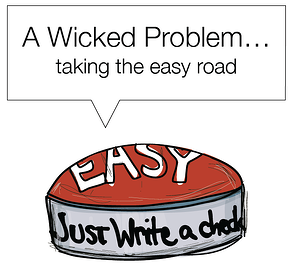MIKE NATALIZIO
HNI CEO
If you’ve been hanging around here lately, you know that one of our hot buttons is the topic of wicked problems. Wicked business problems are different from any old type of problem — we define them as the kind of problems you can’t just write a check to make go away.
Wicked problems can be centered on your people, your leadership, your brand, or your operations, but there is always one thing in common: To solve a wicked problem, someone somewhere has to start acting differently. Sometimes it's you. Sometimes it’s your team. But usually it’s both.
We get the question if we’re being too negative with all of this talk of wickedness. Aren’t wicked business problems a bad thing? Are companies that have these kinds of problems fatally flawed in some way or another?
We want to be very clear on this: Having a wicked problem is NOT a bad thing… but failure to address it is.
These problems are difficult, sure. Every company has some. But these are the kinds of challenges that separate great companies from just good ones.
Fighting wicked problems is our passion. It’s why our team gets out of bed every day. We consider ourselves privileged to witness and assist great companies in taking on their wickedest problems. There’s nothing more rewarding than seeing a CEO, safety director, or HR professional smash through a wicked problem and come out all the better for it on the other side.
At times it's easier to "commiserate" about problems. But that's not enough — we need to let everybody know there's a problem and what needs to change. Rather than commiserate... activate. The difference is remarkable.
Taking on wicked business problems requires people made of tough stuff. In many companies, these challenges make or break careers. Those who are willing to take action, to change behaviors, and to help make things better — those are the ones we call game changers.
Related Posts:
What Keeps You Up at Night? Identify your Wicked Problems.
The Many Flavors of Wicked Problems
Why Your Employees Need to Understand 'The Why’
Why More Employers are Creating a Culture of Transparency
.png?width=69&height=53&name=Acrisure%20Logo%20(White%20Horizontal).png)


![Ready to change the game? [ LET'S TALK ]](https://no-cache.hubspot.com/cta/default/38664/30ca5e22-0848-4392-bb97-fb8581c3bd4f.png)
